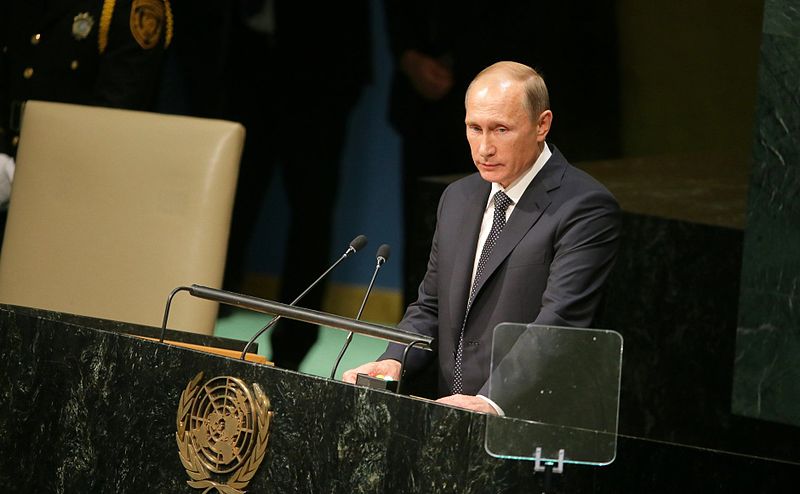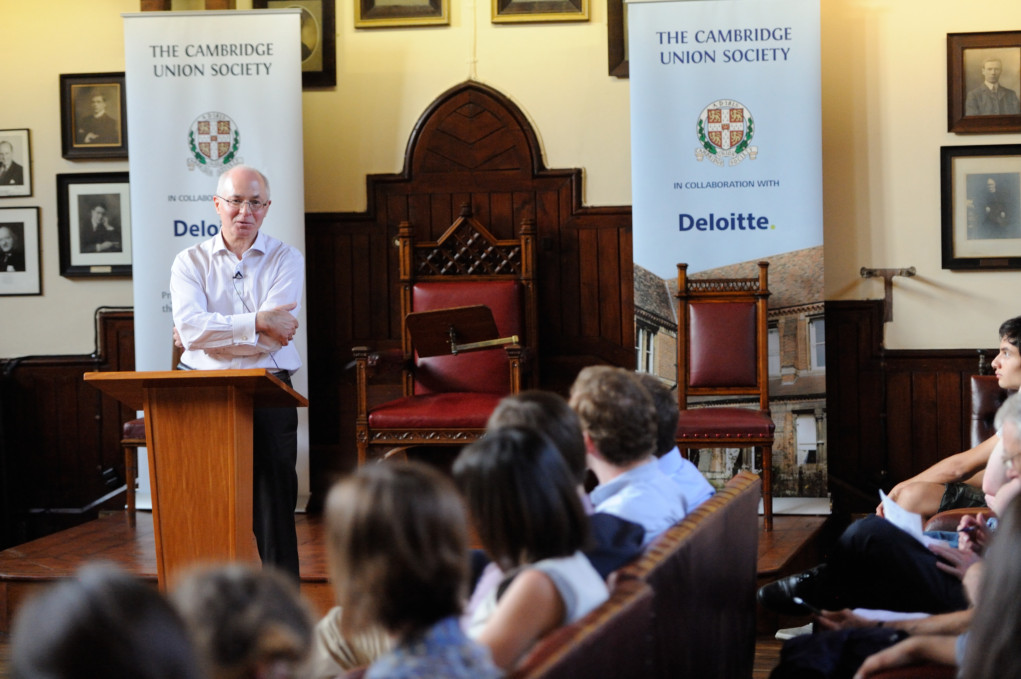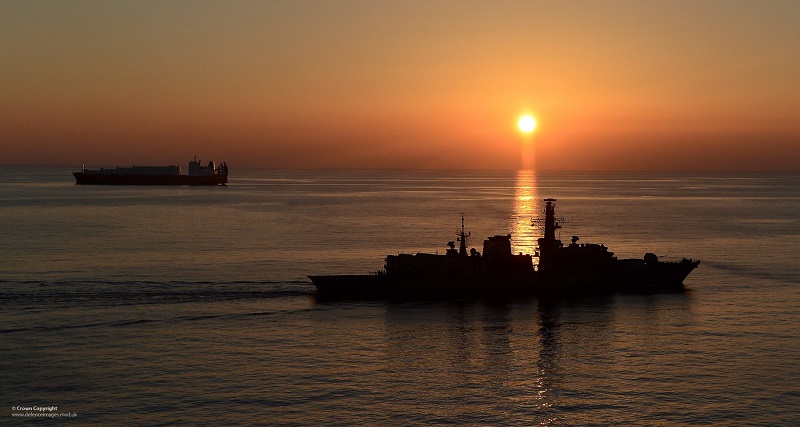At the UN General Assembly, Russian President Vladimir Putin recently called for a “broad international coalition” to fight ISIS and dismissed the West’s calls for the ouster of Syrian President Bashar al-Assad, proclaiming him a bulwark against the spread of terror in the region. This speech followed on the heels of Russia’s recent moves to bolster its own military presence in Syria through the dispatch of tanks, aircraft, and military advisers. Russia has already started bombing targets in Syria, although preliminary reports suggest that this campaign has focused mostly on Assad’s relatively moderate opposition rather than on ISIS.
This week, we asked our program editors:
Does Putin Have a Better Plan for Fighting ISIS than the West?
Ian Goertz: Same Old Joke, But Nobody is Laughing
Program Editor, Canada’s NATO
Looking at Russia’s air bombing missions in Syria, one can draw a similar conclusion between it and Donald Trump’s campaign for the Republican nomination: it makes a lot of noise with little effect. Putin has no better plan for ISIS than the West, or anyone else for that matter. The issue stems from the implementation of an ineffective air power strategy. This has been a common trend, however. The easily forgotten element is that no war can be won in the sky alone. As was overlooked by early air power theorists – Trenchard, Douhet, “Bomber” Harris, and many other such enthusiasts –air power is only one component of winning a conflict.
The most important element to winning an insurgency is on the ground, as there are simply too many places to hide or hold out when being pounded from the sky. Aerial bombardment does not eliminate supply chains, remove local support or effectively stamp out resistance.
The best plan is the one that no one really wants to think about: a legitimate large-scale ground force. While this idea seems unpalatable to the international community given recent forays into conflict zones, anyone who wants to see this conflict come to an end can only do so with effective use of ground forces. Ironically, this is the only point that Trump has had right in his campaign. Interdiction of ISIS in Syria will never come at the end of air-dropped bombs.
Michael Lumbers: A Gift for ISIS
Program Editor, Emerging Security
There is much merit to Russia’s longstanding complaint about U.S. policy in the Middle East –that it is far more adept at toppling regional dictators (Saddam Hussein in 2003, Muammar Gaddafi in 2011) than at cultivating representative and stable successor governments –yet Putin’s recent decision to come to the military aid of Assad’s regime runs the same risk of making an already intractable problem even worse.
That the Kremlin’s actions were likely spurred more by considerations with no relation to events on the ground in Syria should give pause for concern. Putin’s behaviour can be attributed to his wider design for making Russia’s voice heard at the Great Powers table, as well as projecting influence in the Middle East, promoting his long-held belief that sovereign governments should be supported rather than undermined by the meddling West (even as Russia arms and encourages separatists in eastern Ukraine), diverting attention from Ukraine so as to mitigate both Russia’s diplomatic isolation and international support for continued economic sanctions against it, and presenting himself at home as a strongman preoccupied with safeguarding Russia’s global interests and therefore above the fray from the economic malaise that has stirred some domestic unrest.
To be sure, Putin declared in his recent UN speech that the focus of Russia’s attention was on thwarting the expansion of ISIS-held territory. Yet the bulk of Russian airstrikes have hitherto targeted western Syria, where Western-backed militias opposed to Assad’s rule hold sway. ISIS –less of a threat to Assad, who has tended to view the group as a convenient scapegoat in his efforts to persuade international opinion that he is fighting terrorism –has been left comparatively unscathed.
By doubling down on his support for the Alawite regime, Putin has upped the ante. Regional Sunni powers, already anxious that imminent sanctions relief stemming from the recent Iran nuclear deal will embolden Shiite Tehran to increase its support for Damascus and other proxies, will likely reciprocate and intensify arms supplies to Assad’s foes, providing more fuel to a conflict with no end in sight and in which no side has a clear advantage. Continued fighting and Russian-assisted resistance mounted by Assad’s regime will no doubt exacerbate a widespread sense of Sunni marginalization and oppression, from which ISIS has drawn for attracting recruits.
Should Russia eventually find itself entangled in a quagmire of its own making, Putin may choose to extricate himself by bringing pressure to bear on the dependent Assad to negotiate. Chances are, however, that the mercurial and proud Russian leader will be inclined to persist with his gamble. ISIS stands to profit from this mess.
Jonas Becker: Working at Cross Purposes
Program Editor, Procurement
After a week of military action in Syria, it doesn’t appear that Russia is planning on going about things much differently than the U.S.-led coalition. President Putin has so far ruled out sending combat troops, and stated that the airstrikes will be in support of offensive military operations by the Syrian army. This follows a similar line to America and its allies, who have relied on local Kurdish or FSA (Free Syrian Army) soldiers to actively take and hold ground. The real difference lies in the goals of each faction.
A major demand of regional coalition states (Turkey, Saudi Arabia, and Qatar) has been the removal of Syrian President Bashar al-Assad. With vested military assets at its naval facility in Tartus, Russia has repeatedly resisted calls for the removal of Assad, whom Putin describes as a bulwark against terrorism in the region. Both sides are using the same tactics to achieve conflicting goals. With over four years of war in Syria, this is unlikely to bring any kind of resolution to the war.
Of course, the misery and human suffering of the Syrian conflict has also concealed diplomatic opportunities. Paradoxically, the U.S. has actively, if not openly, cooperated with Iran over ISIS in Syria. U.S. Secretary of Defence Ashton Carter has also recently spoken about coordinated aircraft policies with his Russian counterpart, Sergei Shoigu, in the first high-level talk of this type since the Russian annexation of Crimea last year. A shared mandate of cooperating against ISIS, and perhaps setting aside Assad’s fate, may lead to a mutually beneficial outcome.
Leon Fleddermann: Who Dares Wins
Research Analyst
Vladimir Putin’s boots on the ground in the Middle East is testament to the failures of the West to tackle ISIS with a determined strategy. The power vacuum left by the crumbling Assad regime and the Shiite-led Iraqi government has attracted other powers like Iran and now Russia to grab a chunk of the corpse that is the Middle East. Putin is the life support for the slowly crumbling Assad regime, which has lost most of its international support and is on the verge of losing most of its territory to rivaling factions and possibly its hold on power.
Putin’s support, both in word and deed, is a sign of desperation, an attempt to uphold the few remaining Moscow-friendly governments in the world. He is trying to divert attention from the stagnant economy in Russia by showing off as a strong man in a region of continuing crisis. Russian forces in Syria are also, however, proof of a failure in American foreign policy to signal power in the Middle East and enforce a red line. Putin is empowered not only in Ukraine, but now in the Middle East by a U.S. that seems unwilling to push forward its aims by force and negotiate from a position of power.
This perception has encouraged ISIS, Iran, and Russia to test the waters and advance their cause mostly unhindered. Putin doesn’t necessarily have a better plan or a superior strategy; he is simply more daring and desperate to enforce his foreign policy aims in the region.
Michael Kang: Who´s Fighting Who?
Research Analyst Intern
With both the West and Russia unable to dedicate their efforts to solely fighting ISIS in this multi-front war, the contest for military success has been characterized more by their differing approaches rather than their effectiveness. The U.S.-led intervention has consisted of an aerial campaign against key ISIS sites and military support in the form of training and equipment to rebel forces. Although air strikes have slowed ISIS from making further progress, the military training and donation of equipment to rebel forces has largely been a failure, with some supplies falling in the hands of an al-Qaeda affiliated group, the al-Nusra Front. As well, the U.S.-trained rebel forces have contributed primarily to the fight against Assad’s regime rather than ISIS.
At the other end of the spectrum, Russia has adopted a more strong-handed approach, sending heavy military hardware and several hundred troops to assist in non-combative roles in addition to their air strikes on ISIS. However, the majority of military support is being sent to assist the Russian-backed Assad regime in its attempt to regain lost territory from other opposition forces. Until Russia and the West reach a consensus on their positions regarding the legitimacy of the Assad regime and coordinate the campaign against ISIS, their military support for opposing sides of the Syrian civil war will only prolong this conflict and hinder efforts against ISIS.




